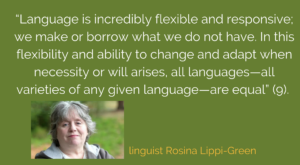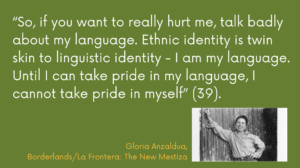Trauma-Informed Equity-Centered Writing Instruction Across the Disciplines
Following the summer 2023 Advanced WAC Academy focused on Trauma-Informed Equity-Centered Writing Pedagogies, participants teamed up with the UWP again in the fall to share what they had been thinking about with faculty from across the disciplines in two WAC workshops. Kerri Flinchbaugh worked with Drs. Nicole Moore and Monisha Atkinson (both from the College of Education’s Teacher Education) to offer Linguistic Justice in Higher Education: Equity-Centered Writing Pedagogies.
Flinchbaugh also worked with Tamra Church (Health Education & Promotion) and Sheresa Blanchard (Human Development & Family Science) to deliver the workshop Resilient Writing Communities: Trauma-Informed Teaching & Writing.
In Linguistic Justice in Higher Education: Equity-Centered Writing Pedagogies, presenters explain how a one-size-fits-all approach to language can be used to justify linguistic discrimination on the basis of race, referencing April Baker Bell’s book Linguistic Justice: Black Language, Literacy, Identity, & Pedagogy. Recognizing that language is a site of both power and identity, linguistic justice explores how Black students’ linguistic and cultural identities can be respected and valued in the writing classroom. Embracing linguistic pluralism allows for the legitimacy of multiple language practices, providing students with flexible tools to use as they navigate different linguistic contexts. Presenters discussed how strategies like code meshing allow students to incorporate multiple languages and dialects into their writing, critiquing notions of which languages are “correct” while allowing students to make strategic rhetorical choices within their texts and maintain agency.
In the Resilient Writing Communities workshop, participants learned about how trauma-informed writing pedagogies grounded in community resilience can reduce the risk of re-traumatization while supporting all student writers. While Church explored the neurological effects of traumatic stress and their impact on students’ abilities to learn, Blanchard shared pedagogical nuggets from Tayles’s (2021) article “Trauma-Informed Writing Pedagogy: Ways to Support Student Writers Affected by Trauma and Traumatic Stress”. By understanding trauma responses, writing instructors can recognize ways trauma may alter students’ ability to think, learn, and perform as a kind of neurodiversity, one that merits pedagogical practices grounded in appreciation and accommodation of student needs.
Participants were also introduced to a university-wide resource: the Academic Resilience Consortium (ARC). Following this summer’s workshop, the UWP obtained an institutional membership to ARC, making its events and resources available for free to all ECU faculty, staff, and students. ARC is a collaborative community dedicated to promoting academic resilience in higher education in order to help college students learn, grow, and reach their goals. It aims to improve higher education, advance respective fields, and promote college student success. The attached document provides instructions for creating an ARC account along with brief descriptions of the types of resources available.

Both workshops will be offered again in spring 2024.
· Resilient Writing Communities: Trauma-Informed Teaching & Writing
o Wednesday, January 24th at noon face to face or
o Thursday, February 22nd at 10am online
· Linguistic Justice in Higher Education: Equity-Centered Writing Pedagogies
o Tuesday, March 12th at 2pm online
